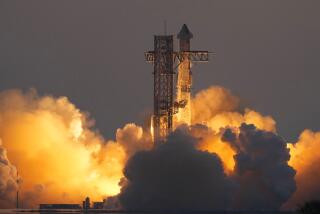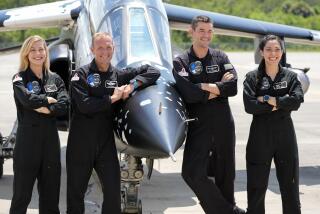SpaceX capsule captured by space station crew in historic mission
For the first time, a cargo-carrying spacecraft made by a private company arrived at the International Space Station.
SpaceX’s unmanned Dragon spacecraft was captured by the space station’s 58-foot robotic arm by astronaut Don Pettit aboard the space station. The linkup took place about 250 miles above northwest Australia at 6:56 a.m. PDT.
“Looks like we got us a Dragon by the tail,” Pettit confirmed.
At that moment, engineers watching at SpaceX’s control center at their Hawthorne headquarters, as well as NASA mission control in Houston, began cheering, with rounds of high-fives and handshakes.
The cone-shaped capsule was grappled to the station’s arm after three days of circling the Earth. NASA is now determining when the spacecraft should dock with the station and when crew should unload the half-ton of cargo, water and clothes.
INTERACTIVE: SpaceX’s demonstration mission
SpaceX, officially known as Space Exploration Technologies Corp., is the first private company to embark on such a mission. Up until now, sending a spacecraft to the space station has been a feat that has only been accomplished by four of the world’s wealthiest and most technologically advanced governments: the United States, Russia, Japan and the European Union.
The arrrival of the Dragon wasn’t flawless. A problem with the spaceraft’s onboard sensors pushed back the capture for about two hours later than planned.
Elon Musk, founder and chief executive of SpaceX, said Thursday in an interview with The Times that he knew the company was embarking on the most difficult part of the mission.
“I think we’re approaching the highest-risk portion of the mission,” he said. “But I think we’re ready to go for the home run.”
But the historic hookup was a major milestone in efforts to shift spacecraft development -- long dominated by governments and large, entrenched aerospace firms -- to privately funded firms such as SpaceX that so far have been funding their ventures largely on their own.
SpaceX’s mission is considered the first test of NASA’s plan to outsource space missions to privately funded companies now that the fleet of space shuttles is retired. SpaceX aims to prove to NASA that its Falcon 9 rocket and Dragon capsule are ready to take on the task of hauling cargo -- and eventually astronauts -- for the space agency.
The Dragon was launched Tuesday aboard SpaceX’s Falcon 9 rocket from Cape Canaveral, Fla., to start the demonstration flight to the space station.
SpaceX makes the Dragon and Falcon 9 at a sprawling facility in Hawthorne that once was used to assemble fuselage sections for Boeing 747s. The hardware is put on a big rig and trucked to Cape Canaveral for launches.
The company, with about 1,800 employees, has a $1.6-billion contract to haul cargo in 12 flights to the space station for NASA. If the current test mission is successful, SpaceX will begin fulfilling the contract later this year.
RELATED:
SpaceX: A new frontier for space travel
NASA hails SpaceX launch as ‘a new era’ for spaceflight
SpaceX hits milestones; capsule on track to dock with space station
Twitter.com/@wjhenn
More to Read
Inside the business of entertainment
The Wide Shot brings you news, analysis and insights on everything from streaming wars to production — and what it all means for the future.
You may occasionally receive promotional content from the Los Angeles Times.











